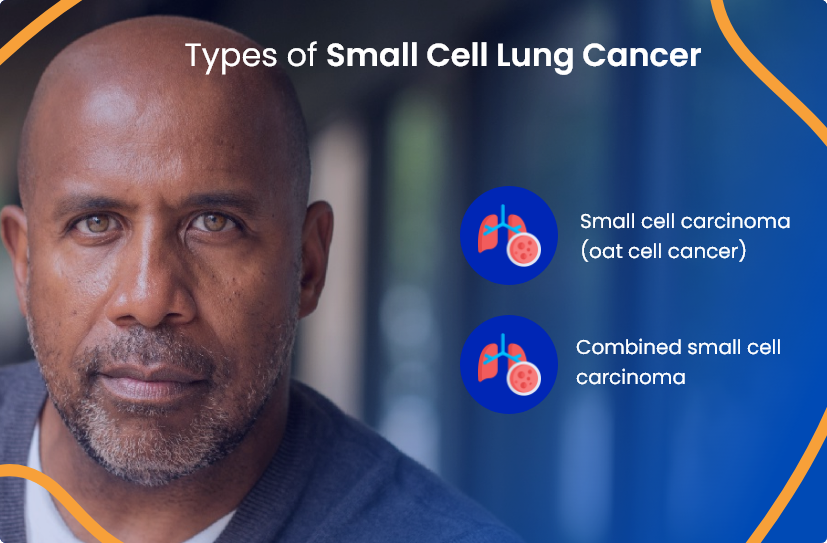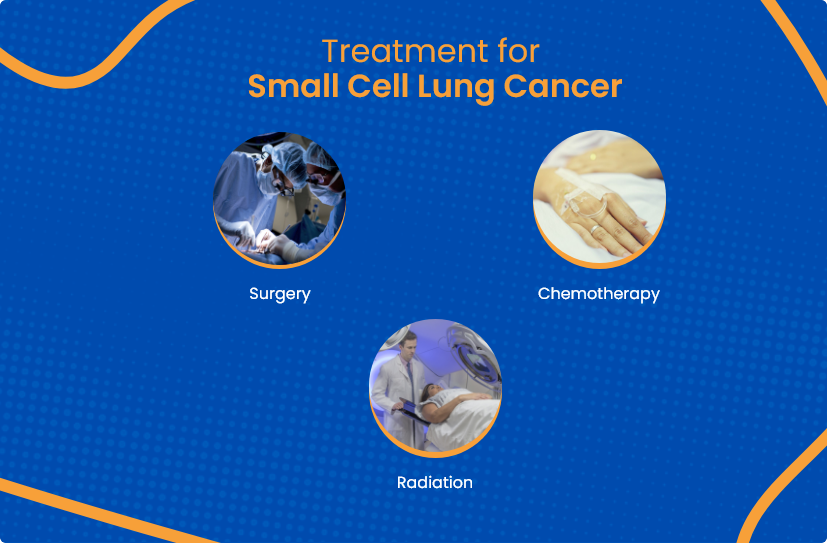
Book a Consultation
Thank you!
Your form has been sent successfully.

Hearing “small cell lung cancer” can be unsettling. This fast-growing cancer tends to spread early and may return after treatment. But knowing what you're facing—and having the right team—can make all the difference.
At ACTC, we combine trusted treatments with a deeply personalized approach, guiding you from diagnosis to care with one goal: to treat you like we would treat our own.
Doctors classify small cell lung cancer into two categories: small cell carcinoma and combined small cell carcinoma. These categories help doctors choose appropriate treatment options.

Small cell carcinoma: This is the most common form of SCLC. It typically starts in the lungs and can spread quickly to other parts of the body.
Combined small cell carcinoma: A mix of small cell lung cancer and any non-small cell lung cancer component (like adenocarcinoma or squamous cell carcinoma).
Early-stage small cell lung cancer often has few symptoms. As it progresses, you might notice:
Persistent cough
Coughing up blood
Chest pain or discomfort
Trouble breathing or wheezing
Other possible signs include hoarseness, fatigue, facial or neck vein swelling, and loss of appetite. Let your doctor know if you experience these or any new symptoms.
Doctors diagnose small cell lung cancer using a detailed physical exam and review of your medical history. They also use imaging tests such as a chest X-ray, CT scan, or MRI to see detailed images of your lungs and surrounding areas.
A bronchoscopy, which involves using a thin tube with a camera to look directly inside your airways, may also be performed. Doctors may also examine a sample of your sputum (phlegm coughed up from the lungs) to check for cancer cells.
Treatment for small cell lung cancer depends on the type and stage of the disease. When the condition is advanced, the goal of treatment typically shifts toward symptom relief.

Your treatment plan may include:
Surgery: Doctors consider surgery if there is only one tumor and no evidence of spread, although this scenario is uncommon with SCLC.
Chemotherapy: Uses drugs given orally or through a vein (intravenously) to travel through your bloodstream and kill cancer cells throughout your body.
Radiation therapy: Targets and destroys cancer cells using high-energy beams directed precisely at the tumor area.
The best approach for you will depend on the specifics of your diagnosis, and your care team will explain your options clearly.
At ACTC in Florida, our cancer specialists understand how overwhelming a diagnosis like small cell lung cancer can be. That’s why we focus on more than just treatment—we focus on you.
From your first appointment, our team works closely with you to build a personalized care plan based on your specific diagnosis, health needs, and goals. We also provide emotional support and practical tools to help you through each step.
Here are the providers you can consult at ACTC:
ACTC was founded to bring expert cancer care close to home—and our team’s two decades of experience mean you don’t have to leave Florida for advanced treatment. For small cell lung cancer, we offer rapid diagnostics, personalized therapies, and continuous support in one trusted location.
Call 352-345-4565 or book an appointment.

Cancer patients look for a sense of trust and care once diagnosed. At ACTC, we make it our priority to make them feel secure about the journey ahead. Our state-of-the-art mechanisms and dedicated team of specialists ensure world-class care. We handle everything from staging to treatment to long-term follow-up. With over 2 decades of experience in cancer treatment and care, our experienced team of specialists and clinical staff are guaranteed to provide the best possible care.
Schedule a consultation by calling
 352-345-4565
352-345-4565
Small cell lung cancer tends to grow and spread quickly. Many people are diagnosed after it has already moved beyond the lung, so doctors usually stage and start treatment without delay.
Most small cell lung cancers are found after they’ve already spread. Even small tumors may have invisible cells elsewhere. That’s why doctors typically use whole‑body treatments (chemotherapy with immunotherapy) and radiation, rather than surgery alone.
Doctors group lung cancer into two main types: non‑small cell lung cancer—which includes adenocarcinoma, squamous cell carcinoma, and large cell carcinoma—and small cell lung cancer. Mesothelioma is a different cancer of the lining of the lung, and lung nodules are not a cancer type.
There isn’t one “best” treatment for everyone. It depends on the type of lung cancer, test results on the tumor, your overall health, and your goals. When cancer has spread, care often uses medicines that treat the whole body (chemotherapy, immunotherapy, or targeted therapy when appropriate). Radiation or procedures can help with symptoms or specific spots. Surgery is rarely used once cancer has spread.
Schedule a consultation by calling
 352-345-4565
352-345-4565